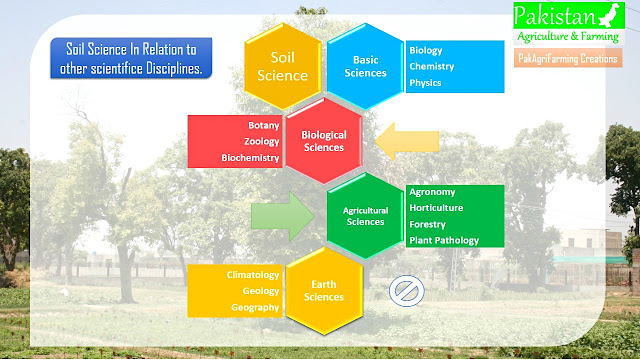Soil science is a scientific discipline concerning the study of soil as a natural resource from the point of view of plant growth.
What is Soil?
From agricultural point of
view, soil is defined as the non-consolidated upper part of the
earth's crust that serves as a natural medium for the growth of land plants.
In short, soil is a habitat for plants.
But for different
disciplines of science, the definition of soil is different, for instance, a geologist or mining engineer may call
"the fragmented rocks or debris
covering the rocks” and a civil
engineer may call it "earth or
the foundation material for constructing houses and roads”; and an economist may call it as 'land'.
In this article, we will be
limiting only to the definition and branches of soil science.
Soil science is an applied
scientific discipline of comprehensive nature because of its relationships with
so many other sciences.
Branches of Soil
Science
1. Soil Chemistry
It deals with the chemical
constitution, chemical properties and processes taking place in the soil.
2. Soil Biology
It refers to the soil
inhabiting organisms and their biology, functions and activities. For examples,
insects and nematodes.
3. Soil Mineralogy
This branch deals with the
primary and secondary soil minerals and their contribution to the chemistry,
physics, fertility and biology of the soils and their relation to soil
genesis.
4. Soil Genesis and Classification (Pedology)
Soil genesis deals with the
weathering of rocks and minerals and factors and processes of soil formation
whereas, soil classification is the systematic rearrangements of soils into
groups or categories on the basis of their characteristics.
5. Soil Physics
It concerns with the mechanical
behavior of the soil mass, that is, the physical properties of soils with
emphasis on the state and transport of matter especially water and energy in
the soil.
6. Soil Fertility
It concerns the ability of
a soil to supply the essential plant nutrients for plant growth.
7. Soil Salinity
It concerns with the excess
soluble salts present in the oil their reclamation and soil management for
saline agriculture.
8. Soil Survey
The systematic examination
of the soils in the field and lab, their description, classification, mapping
and interpretation according to their suitability for different management
systems is dealt with in soil surveys.
9. Soil Conservation
It deals with the
protection of soil from the physical loss by erosion (by wind and water) or
chemical deterioration. Thus, soil conservation is concerned with a combination
of all management and land use method that safeguard the soil against deterioration
by natural or human induced factors.
10. Soil Microbiology
This important field, deals
with the microbial communities in the soil, their roles and characteristics
with respect to soil fertility and land reclamation and especially it concerns
with the nutrition of plant through root nodulation or diseases caused by plant
pathogenic microbes in the soil.


